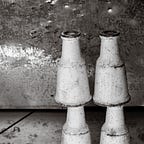The Spillage
It started slowly, crept in from the edges, and so nobody in the little valley town noticed the old tree was losing its color until it hung in a shimmering cloud above its leaves, shifting from green into blue into violet into red and back again, and its body, its roots and branches, cut a sharp silhouette into the world. They cordoned it off, but still the townsfolk gathered in crowded rings around the perimeter fence to watch the color pour out into the air, like water from a punctured balloon, watch the subtle shifting of it, hardly any of them noticing the change in its shade until it had come and gone, not missing one until it had become the next.
Word of the phenomenon caught and spread, and soon the town was packed with people. The valley had always been a popular tourist spot — folks had always come from all around the world to see the changing leaves set the mountains alight with gold and crimson, clotting the narrow, winding roads with RVs and campers and bodies packed in for pictures. But these new crowds were larger than any even the oldest of the townsfolk had seen, in even the hearts of the autumns of their youth. In a few days the iridescent cloud above the tree dissolved into colorless air, leaving only the shadow-body behind. But still more people came flocking to the valley to see the hole in the world the tree had become, and pushed to the edges of the crowd, the townsfolk were afraid. They held each other close, held themselves closer, wondering if they too would find their color draining, become featureless and sharp. But there was wonder, too, and the people marveled at how much the thing before them held: history, expanse.
Not long after the old tree’s color went, all the others followed. In one last autumn shift, every tree in the basin of the valley and upon the mountains that hemmed it in shed the skin of their being, and for many days the blue of the sky was lost behind the spectrum spilled over it. All the newcomers gathered in the fields to watch the colors leak up into the air, and more people came, more and more and more, and soon it was impossible to walk through the crowded streets without the edge of a silhouette slicing through you, and people came down from the blackened mountains bloody from a thousand thousand cuts.
Then the tenor changed. All those who had come into the valley wanted to leave, and many did without a scratch. By the time they had all cleared out, the townsfolk could not make it; the roads were now too narrow, and the shadows’ waiting teeth innumerous and sharp. But even if they could have, they never would have tried. This was still their home, after all; where were they to go? And like an idea, the spillage kept spreading, from the trees into the earth, from the earth into the roads atop it, and the cars and houses atop those, and soon the world was black and white, stark and simple, full of nothing but sharp shapes, and the people all stopped moving for fear of being bitten. They stood still, and thought of presence, and of absence, and remembered all they’d lost.
Vasilios Moschouris is a gay stay-at-home writer and Best of the Net nominee from the mountains of North Carolina. His writing has appeared in Chautauqua magazine, Roi Fainéant Press, Hobart, and in the museum of americana. Unfortunately, he can be found on Twitter @burnmyaccountv.
